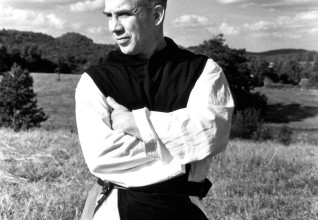'Love for the paradise mystery' is a dominant motif woventhrough all the writings of Thomas Merton—a gossamer thread of mystical insight and prophetic urgency that fastens together theassemblage of his multi-focused literary legacy. Now, forty years after hisdeath, a pentimento pattern of ecological consciousness becomes evidentthroughout his corpus as its complexity and unity become more trans-parent with time. As the contemporary ecological crisis deepens, weurgently require more than instrumental remedies to stem the life-lossof our ecosphere suffered at human hands.




I wish I could talk to Merton about how this contemplation can be exhibited. My fiance is an atheist who has no interest in spiritual contemplation, and yet he is a man of deeply compassionate and life-affirming moral convictions who believes that the earth must be guarded and saved. How do we honour the convictions of those who are uncomfortable, rather than unfamiliar, with the contemplative way?
Also, it’s interesting for me, as a fan of process theology, to be entreated to search for a “paradise mind.” I actually don’t want to go backward to Paradise but forward into a new way of being. I see Paradise as the time of one’s childhood – what one thinker called “first childhood”, and would rather move into “second childhood”, where one is all the more filled with wonder at the world around oneself, because our understanding is so much more rich. As a stumbling disciple of Jesus, too, this is illustrated by his return with scarred palms. For me, a return to Paradise is a denial of all that has happened, and perhaps a forgetting. I prefer to stand in the City of God among the restored and renewed vegetation and sparkling river and proclaim the freedom that means so much to us because we remember our slavery. I want to be Miriam, not Eve! 🙂